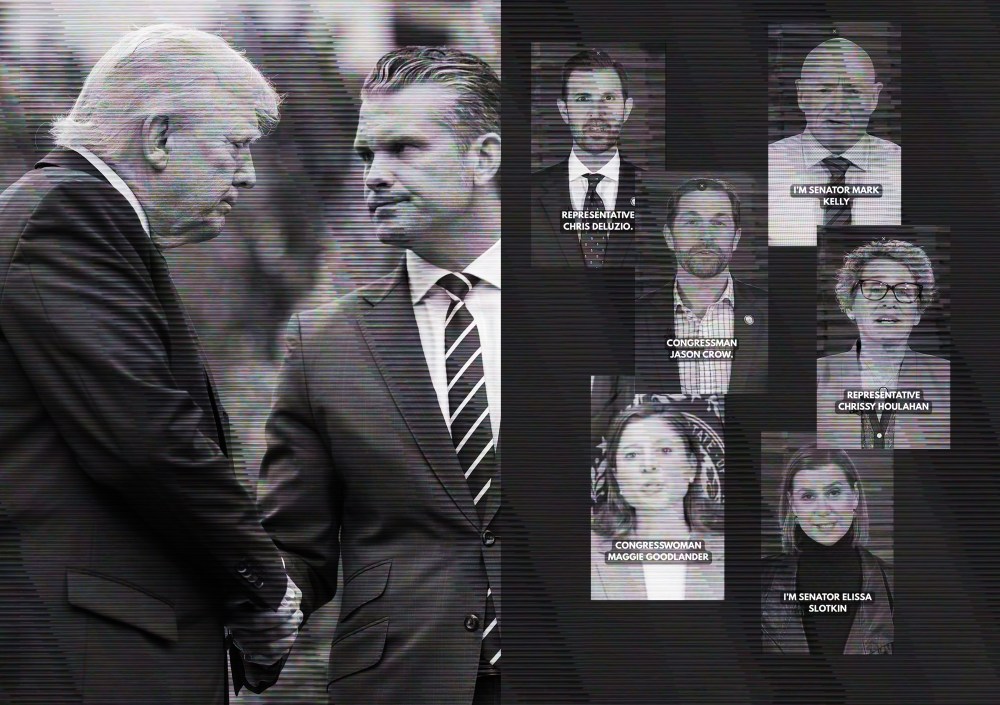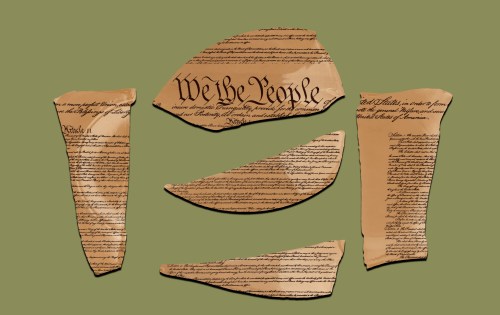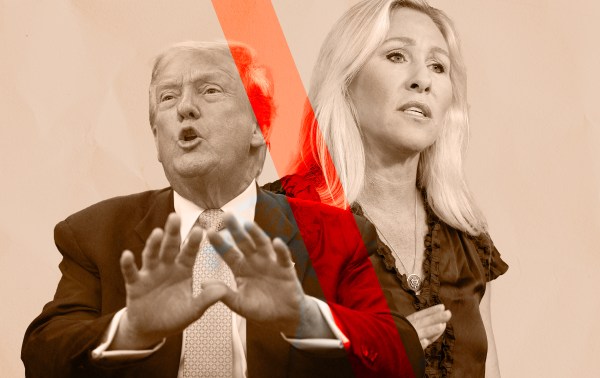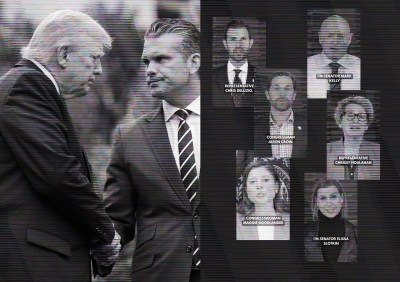Turn any article into a podcast. Upgrade now to start listening.
Premium Members can share articles with friends & family to bypass the paywall.
You’re reading Boiling Frogs, Nick Catoggio’s daily newsletter on politics. To unlock the full version, become a Dispatch member today.
“What is postliberalism?” is a hot topic lately among right-wing intellectuals. We have a neo-Nazi to thank.
Nick Fuentes’ chummy conversation with Tucker Carlson last month rattled the right by quasi-officially welcoming white supremacy into the “mainstream” postliberalism that Carlson represents. Classical liberals were mortified, of course, but so were reactionaries who are willing to go quite far in repudiating liberalism. Just not that far.
Most Republicans are comfortable enough with postliberalism to have rationalized preferring a corrupt, vindictive, coup-plotting criminal who all but promised to govern autocratically if reelected to whatever Democrats were offering on the ballot last year. But asking them to make common cause with groypers too? Nope. The moral anguish is just too much.
Hence the recent interest in precisely delineating ideological boundaries. If you relish norm-busting right-wing ruthlessness at the libs’ expense but don’t want a snootful of Fuhrer-worship for your trouble, you suddenly have a strong incentive to explain why postliberalism means this but certainly not that. Let’s not sully the good name of boorish right-wing authoritarianism by associating it with Nazis, please.
Big-think questions about ideology are above my intellectual pay grade. (Thankfully, they’re not above Jonah’s.) But here’s a useful rule of thumb to determine whether someone is postliberal. Show them this 90-second video and ask them what they think of it.
American soldiers remain bound by law and must follow it. Is that axiomatic? Or seditious?
Not surprisingly, my answer differs from the answer given by MAGA toadies like White House deputy chief of staff Stephen Miller, who said of the clip, “Democrat lawmakers are now openly calling for insurrection.” At the core of Trumpism is the belief that, in a contest between what the law says and what the leader wants, the law must yield. It’s the same logic that caused populists to lose their minds a few months ago when progressives took to reminding illegal immigrants of their legal rights. For all his vices, Miller at least has the virtue of consistency.
A message from The Dispatch
Read The Morning Dispatch Free
We’re taking our flagship newsletter out from behind the paywall this week. If you’re looking for a greater understanding of the biggest stories shaping your world, give The Morning Dispatch a try for free—because insights beat outrage.
You are receiving the free, truncated version of Boiling Frogs. To read Nick’s full newsletter—and unlock all of our stories, podcasts, and community benefits—join The Dispatch as a paying member.
Stories We Think You’ll Like
Thank God the Constitution Is Liberal
Other modes of government have famously sucked.
Disarray at the Pentagon
The Defense Department turns inward, prompting high-level resignations and leaving officials around the world in the dark.
Postliberalism: Flirting with Fascism | Interview: George Weigel
'I’m not getting the eugenic vibe.'
The Democratic veterans in the clip are obviously correct on the merits. But the fact that they’re correct shouldn’t obscure the absurdity of what they’re proposing. American soldiers must follow the law? What law?
No one knows what the law is now, by design, least of all a 20-year-old in a profession that demands obedience to authority and the dutiful following of orders.
A legal cloud.
The president is poised to attack Venezuela. Which law authorizes him to do so?
There is none, of course, and the White House isn’t pretending there is. Three days ago, the State Department tried to backfill a justification by designating Cartel de los Soles, allegedly headed by Venezuelan President Nicolás Maduro, a foreign terrorist organization. But “Cartel de los Soles” isn’t actually a cartel. And the “foreign terrorist organization” designation doesn’t grant the U.S. military any authority to use force. It grants the Justice Department authority to prosecute individuals who provide material support to the organization.
How about bombing boats in the Caribbean that are supposedly engaged in drug trafficking? What’s the legal authority for that?
Again, nada, and the president doesn’t plan to ask Congress for any. As such, “a broad range of specialists in laws governing the use of lethal force have called Mr. Trump’s orders to the military patently illegal,” the New York Times noted late last month. Even in closed-door briefings to Congress, administration lawyers reportedly haven’t been able to articulate a theory for why it’s now lawful to treat criminal suspects as combatants engaged in acts of war beyond vague mumbling about Article II.
When members of Congress reminded the president’s deputies that the War Powers Act limits him to 60 days of unauthorized “hostilities” before he’s required to seek approval from the legislature, the DOJ replied that blowing people up on suspicion of drug trafficking doesn’t rise to the level of “hostilities” within the meaning of the statute. In other words, what the boats are doing is somehow enough like war to entitle the military to kill the occupants summarily but not enough like war that Congress should have any say over whether Trump’s killing spree continues.
All of that being so, imagine you’re a twentysomething naval officer who’s just received an order to bomb another boat in the Caribbean. You know that you must obey a legal order and that you mustn’t obey an illegal one. Question: Is the order that was given to you legal or not?
I’m a law-school graduate, and I couldn’t confidently answer how the Supreme Court might resolve that question. Especially a court with a majority prone to granting the executive freakishly wide latitude in exercising his “core” powers.
But let’s say that you, the conscientious naval officer, are less concerned with airy questions about legal authority than with the bottom-line repercussions for your own potential criminal liability. If the dark legal cloud that Trump creates over everything he does has made it impossible for you to tell whether an order is legal or illegal, are you better off erring on the side of obeying or disobeying?
That question is much easier. As we’re about to see, you’re better off obeying. And not just for the usual reason that “yes, sir” is the default answer in any military.
A crisis of authority.
There’s an obvious problem for our postliberal executive in trying to engineer a system in which no one really knows what the law is and therefore no one who serves him can fairly be held accountable for breaking it. Namely, the government includes lots of people whose job it is to explain the law.
Some of those people are judges, of course, but the judiciary only ever gets involved after someone has made a fateful decision to do something questionable. You, the naval officer, need guidance before committing to a course of action that could land you in legal jeopardy. Whom can you trust to provide that guidance?
No one, it turns out. There’s a crisis of authority within the government, and that too is by design. The Trump administration has done everything it plausibly can to deprive members of the military, and of the wider federal government, of access to competing legal and moral authorities that might restrain presidential action.
It’s not a coincidence that one of the first things Defense Secretary Pete Hegseth did upon taking office was fire the top lawyers at the Army, Navy, and Air Force, without any pretense that they were bad at their jobs. On the contrary, he said, he fired them because he hoped to remove potential “roadblocks” to implementing military decisions. That is, he didn’t want anyone around who might have the integrity to declare a presidential order illegal and the authority to convince the rank-and-file not to obey it.
To understand how deep the White House’s aversion to legal “roadblocks” runs, recall that the administration wanted to put one of the most sordid, least qualified goblins in Trump’s menagerie in charge of an agency that’s supposed to protect whistleblowers. (His nomination was ultimately withdrawn, but he did land another cushy administration job.) That was a neon sign advising federal employees of all stripes that there’ll be no safe haven for anyone who makes trouble for the president by exposing wrongdoing within his government.
But what about when the law seems clear even absent guidance from attorneys? Postliberals need a way to encourage the military to ignore it in those cases, too, if the president asks them to do something illegal. And they’ve found one: Even if you think the law forbids you from doing something Trump wants, you may rest assured that that law won’t be enforced.
Hegseth, for instance, has repeatedly sought to reassure U.S. troops that they won’t be punished for committing war crimes. It’s been a hobby horse of his for years, but he converted it to official policy in September when he refused to rescind the Medals of Honor given to soldiers who perpetrated the massacre at Wounded Knee and told a gathering of generals that we’re going to “untie the hands of our war-fighters” in combat, wink wink. The White House can’t scrub prohibitions against atrocities from the law books, but it sure can decide not to charge anyone for committing them.
And insofar as any renegade soldier might worry about being prosecuted by a future administration, the White House has also thought of that. The method to the madness of the president’s corrupt pardons this year is to induce future lawbreaking that might serve his interests by immunizing those who’ve served him in the past. The foot soldiers of January 6 were pardoned immediately; the masterminds of the coup plot have since been pardoned, too. If the president tells a soldier to execute an enemy prisoner in cold blood and he does it, he should have every confidence that no prosecutor, judge, or military tribunal will be able to reach.
The ethos of Donald Trump’s military is to always err on the side of ruthlessness and to never hesitate for fear of legal consequences. That’s been the president’s vision since before he reached the White House, in fact. At a Republican primary debate in March 2016, he was told that his plan to kill terrorists’ families in the name of deterrence was a war crime and that American service members wouldn’t obey it. “They’re not gonna refuse me. Believe me,” he retorted boastfully. “If I say do it, they’re gonna do it. That’s what leadership is all about.”
A soldier who disobeys an unlawful command is at far greater risk of court-martial in this administration than one who dutifully carries out an order to commit murder.
The cherry on top of this crisis of authority is that it’s self-reinforcing. Apparently, some 5,500 employees, many of them experienced attorneys, have left the Justice Department since January. (The Pentagon is also emptying out under Hegseth, not surprisingly.) Meanwhile, interest in working for the agency has reportedly fallen off a cliff among top-tier law students, and no wonder: The job now requires having “to drop cases for political reasons, to find evidence for flimsy investigations and to take positions in court [that have] no legitimate basis.” Even courts don’t respect the DOJ anymore.
When you fire honorable officials for following the law instead of following illegal or unethical orders, you incentivize other honorable officials to quit and discourage honorable young applicants from wanting to replace them. That leaves America with a law enforcement agency led and increasingly populated by dummies and miscreants who either can’t properly follow the law or are choosing not to do so lest they anger the mob boss to whom they answer.
Not even the Justice Department can say what the law is now, apart from “whatever Donald Trump says it is.” And if Donald Trump says blowing up boats in the Caribbean is legal, then legal it must be.
What now?
It’s ominous that the video of veterans reminding service members that their duty to the law supersedes their duty to the president features Democrats exclusively.
Perhaps Sen. Elissa Slotkin and the other Democratic veterans involved didn’t think to ask right-wing colleagues like Dan Crenshaw and Brian Mast whether they’d like to participate. If not, I wouldn’t blame them much. Why bother? How likely is it that any Republican would risk his neck politically by affirming that sometimes the law isn’t whatever Trump says it is?
By the logic of the postliberal GOP, disrupting the leader’s authority to work his will truly is seditious, the sort of behavior that only a Democrat would condone. (By the logic of liberalism, an administration that’s deliberately made the law opaque and unpredictable is by far the most seditious player in this conflict.) The question of to whom and to what the U.S. military owes its ultimate loyalty is now a partisan issue.
But despite the fact that I agree with Slotkin et al., I find myself wondering what the point of their video was. What are Democrats proposing to do to help soldiers feel comfortable, or at least more comfortable, in refusing illegal orders?
Are they offering to protect them legally somehow? They don’t say. Are they threatening to prosecute them if they obey illegal orders when Democrats regain control of the DOJ? Maybe so. Sen. Mark Kelly, who appeared in the video, noted the ambiguity for service members involved in the boat strikes: “What does this mean for their future if they find out later that they did this without legal justification?” he asked. “It puts them in legal jeopardy at some point.”
I doubt that, and not just because Trump is destined to pardon the loosest cannons in the ranks before he leaves office. Americans have always looked dimly on punishing troops for behaving ruthlessly in war. A Democratic president would have a heavy lift convincing the public to support charging a soldier who followed Trump’s orders and relied on reassurances from the top, however corrupt and dubiously sourced, that those orders were legal.
Ultimately, this is another dispiriting case of our enfeebled Congress begging some other arm of the government to do the hard work of restraining an executive on tilt because it lacks the will to do so itself.
In fairness to Slotkin, Kelly, and the rest, that’s not their fault. It’s cowardly Republicans, not Democrats, who have repeatedly punted their constitutional duty to police the president to others. Republicans declined to convict Trump at his second impeachment trial because, they claimed, the criminal justice system would deal with him. And Republicans have declined to rescind his bull-in-a-global-china-shop tariff abuses in the fervent hope that the Supreme Court will corral him eventually.
Congress won’t meaningfully check the president until it’s controlled by Democrats, leaving Slotkin et al. with little recourse to thwart illegal presidential orders except by appealing directly to members of the military to do their duty. I understand it. But having high elected officials begging teenaged jarheads to save America from going full fascist because they’re powerless to do so themselves is low-key one of the most pitiful episodes of the Trump era.
Democrats would profit from reflecting on how pitiful it is and consider prioritizing passing reforms that would deprive the imperial presidency of its most frightening powers the next time they’re in charge of Congress. But don’t hold your breath. They didn’t do it the last time they took power and that was fresh off a failed coup attempt by the other party.
Maybe the next three years of having to watch the administration execute its formula for undermining confidence in the law will finally jar something loose, though. Legal ambiguity plus moral sanction for lawbreaking plus corrupt executive clemency for enablers plus the near-total hollowing out of law enforcement: You don’t need to know the law, only what the president wants, to live without fear of your government. That’s “what postliberalism is.”











Please note that we at The Dispatch hold ourselves, our work, and our commenters to a higher standard than other places on the internet. We welcome comments that foster genuine debate or discussion—including comments critical of us or our work—but responses that include ad hominem attacks on fellow Dispatch members or are intended to stoke fear and anger may be moderated.
With your membership, you only have the ability to comment on The Morning Dispatch articles. Consider upgrading to join the conversation everywhere.